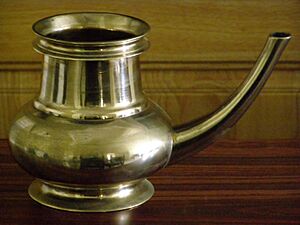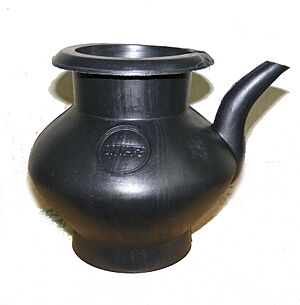Lota (vessel) facts for kids
A lota is a special kind of pot or vessel. It is usually round and has a spout, like a small teapot. People in countries like India, Pakistan, and Bangladesh have used lotas for a very long time, even thousands of years ago! They are often made from brass, copper, or plastic.
In some religions from India, especially Hinduism, the copper lota is very important. It is used in holy ceremonies, prayers, and weddings. Some ancient health practices, like Ayurveda, even say that drinking water from a copper lota can be good for you.
Different places have different names for the lota. For example, in Bangladesh, it is called a bodna. In the Indian state of Kerala, it is known as a kindi.
Contents
History of the Lota
The first lotas and kindis were found in ancient cultures in South Asia. These were from the Copper Age, a time when people started using copper. Some of the oldest examples, dating back to around 2000 BC, were found at ancient sites like Daimabad.
Why is the Lota Special?
Many people admire the design of the lota. Two famous American designers, Charles and Ray Eames, once wrote about how much they loved it. In their report about India, they said the lota was "perhaps the greatest, the most beautiful" object they saw. They were amazed by how simple and useful it was for everyday life.
Different Names for the Lota
The lota has many names depending on where you are.
- In West Bengal (India) and parts of Bangladesh, a spouted pot is called a bôdnā.
- Pots used for religious prayers are often called ghôt or ghôti.
- A lotā in these areas might just mean a bath mug.
- In Odisha, a state in India, even pots without a spout can be called a lota.
- In northern and western India, spouted pots used for prayers are known as Jharis or Achaman Jharis.
- In southern India, some lotas are called Mooku sombu or Pal Kindi. These are sometimes used to feed milk to babies.
How People Use the Lota
Lota in Sayings and Stories
Sometimes, the lota is used in common sayings. In parts of South Asia, people might say someone is a "bependi ka lota." This means a "lota without a base." Imagine a round lota without a flat bottom; it would roll around and not stay in one place! So, this saying describes a person who changes their mind or their loyalties very often.
A new word, "lotacracy," was even made up in Pakistan. It describes people who often switch between different political groups.
Lota in Holy Ceremonies
The lota is a very useful tool in religions that started in India. It is used in many sacred events. These include special fire rituals called yagna, daily prayers known as puja, weddings, and other important religious ceremonies.
Lota for Staying Clean
In South Asia, people also use the lota for personal cleansing. In Bengali, the word lotā can mean a bath mug. People from South Asia who live in other parts of the world might use other items like watering cans or empty bottles for similar cleansing purposes. Muslims also use the lota for a cleansing ritual called istinja.
 | Misty Copeland |
 | Raven Wilkinson |
 | Debra Austin |
 | Aesha Ash |



